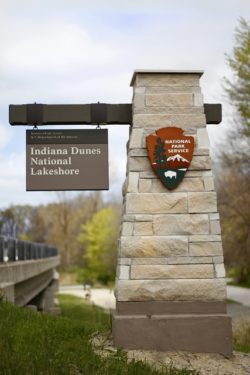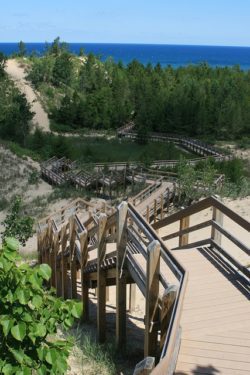
Photo courtesy of Indiana Dunes National Lakeshore.
Lorena Nelson has never been afraid to make her voice heard and stand up for what she believes is right. Starting when she was a custodial worker, and continuing today as Custodial Supervisor for Indiana Dunes National Lakeshore, Nelson fights to reduce the use of harmful chemicals and lessen environmental impacts.
“I remember when I worked as a custodian and people were sick all the time,” recalled Nelson who now serves as team leader for the National Park’s Environmental Management Team. “The cleaning chemicals often caused sore throats and really made people feel bad. That’s when I started doing research to find other options. I knew there had to be a better way.”

National Park Service employee Lorena Nelson shared Indiana Dunes National Lakeshore’s biobased success story at the United Soybean Board’s 2016 Biobased Stakeholders’ Dialogue. (Photo credit: ZimmComm)
Her research led Nelson to transition to a number of biobased cleaning products that she reports have worked well in park facilities. But, she didn’t stop there. After participating in a National Park Service training session, Nelson connected with United Soybean Board (USB) representatives who shared success stories from other National Parks that are using additional soy-biobased products in fleet and vehicle maintenance operations.
Nelson was very interested in learning more. She wanted to continue on the path she began with the cleaning products. Her goal was to not only improve worker health, but also protect the park’s natural resources by lessening its environmental footprint.
“After all, we’re the National Park Service. If anyone should be a sustainability leader it should be us,” she said.

Photo courtesy of Indiana Dunes National Lakeshore.
Nelson attended the 2014 USB Stakeholders’ Dialogue where she learned more and teamed up with USB on a biobased product pilot project. This allowed Nelson and her staff to test a number of products in their fleet operation including penetrating lubricants, greases, bar-and-chain oil, hand cleaner and graffiti remover.
In the spring of 2016, Indiana Dunes replaced many of the fluids in their beach cleaner machine with biobased alternatives and another replacement project is under consideration for a second piece of equipment. These products included hydraulic fluid, motor oil, greases, and antifreeze. The beach cleaner operated smoothly all summer and full evaluations are expected in the fall of 2016.
Next up for Nelson and her team is exploring the use of biobased asphalt products, such as traffic marking paint.
